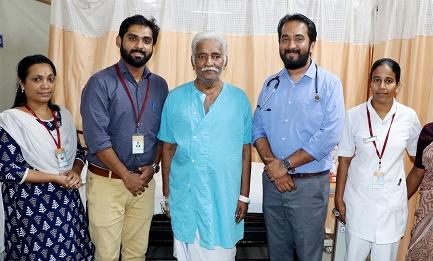A team of doctors at Kochi-based Amrita Institute of Medical Sciences & Research Centre has removed multiple tumours from the lungs and windpipe of a patient, who was in a life-threatening situation. In a rare case of cancer called Neuroendocrine tumour of lungs, doctors removed the cancerous growth to save the patient.
Kochi (ISJ): Haridasan hailing from Kannur in northern Kerala was suffering from breathlessness, cough and sleeplessness. His left lung had completely collapsed and right partially collapsed, and was in a life-threatening condition.
According to doctors, Haridasan was suffering from a rare variety of cancer called Neuro-endocrine tumour of lungs, which was diagnosed only after rigid Bronchoscopic procedure. A multi-disciplinary team of doctors removed the tumour in about a two-hour-long surgery.
“Surgery was a high risk entity in his case since he was breathing through a pin hole opening in right lung and any occlusion of this site during procedure might have lead to his death. Also he had significant cardiac health issues as well,” Dr. Tinku Joseph, Interventional Pulmonologist at Amrita Institute of Medical Sciences & Research Centre, Kochi told Indian Science Journal.
Dr. Joseph said, the patient completely recovered from his ailment, but needs chemotherapy and periodic post-surgical examination to monitor his recovery.
Kerala has reported substantial number of lung cancer cases and according to a study by oncologists at the Regional Cancer Centre (RCC), Thiruvananthapuram, “high prevalence of tuberculosis and scarce availability of facilities and trained manpower thoracic oncology” could be the reason for it. The study revealed, lung is the leading site of cancer in males (15 percent) getting treatment at RCC.
According to another study, though smoking habits have dropped drastically among men in Kerala, incidence of lung cancer in the state is one of the highest in India.
It is a different kind of smoking paradox, says Dr. K. Rajasekharan Nair of Global Institute of Public Health and Santhigiri Research Foundation, Thiruvananthapuram, “This is a different type of smoking paradox compared to the Japanese paradox where men in that country smoke more than men in the United States but still have a lower lung cancer rate. There are several explanations for this paradox, such as age at initiation, use of filters, genetic factors, etc.”
According to Dr. Nair, what has not been taken seriously is the impact of climate change alongwith several other contributing factors for the rising incidence of non-communicable diseases in Kerala.
“Increasing rates of lung cancer seen among non-smokers, including women, could be due to such factors. Issues such as climate change, rising air pollution due to vehicular emissions, widespread practice of burning wastes, especially plastics, indiscriminate dumping of biodegradable and non-biodegradable wastes all over Kerala and extensive construction activities do need an empirical-epidemiological lens in this so-called healthy state in India.”
High alcohol consumption, unhealthy food habits, etc. are also contributing factors for this increase in incidence of cancer in Kerala.


